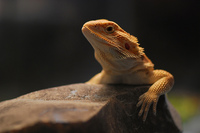Firefly toxicity a problem in lizards
The number of households in the United States that own exotic pets is rising. And, according to the American Pet Products Association - that's an estimate of 13 million pet reptiles (mostly snakes, turtles and lizards) alone. With growing numbers of ownership, of course, comes the wide availability of products, enclosures and the ever necessary foodstuffs that herpetiles need - including insects. There has been one pressing issue that herpetologists discovered a few years ago that affects lizards that are not indigenous to North America.
Variety is the spice of life, it's been said. That can be applied to your lizards' diet, which should based on a basic "salad" comprised of fresh fruits and veggies, (recipe here) and if your herpetile is insectivorous - bugs. Typically, insects such as mealworms and crickets are fare that is offered to anoles, bearded dragons and the like. But, during these few warm weather months in our area primarily, some well-meaning pet owners try to offer something a little out of the ordinary to their cold blooded friends, and catch insects from their backyards for them to eat.

flickr photo courtesy of David
To learn more about this issue and recommendations in herpetile care, consult Melissa Kaplan's website, http://www.anapsid.org/. Kaplan is a renowned authority on reptiles and their care, and author and co-author of three books.
Lorrie Shaw is a pet blogger, a regular contributor to AnnArbor.com and owner of Professional Pet Sitting. She has extensive experience with animals including dogs, amphibians, exotic birds and cats, and is always interested in learning new concepts in animal behavior and health. Contact her via e-mail.

